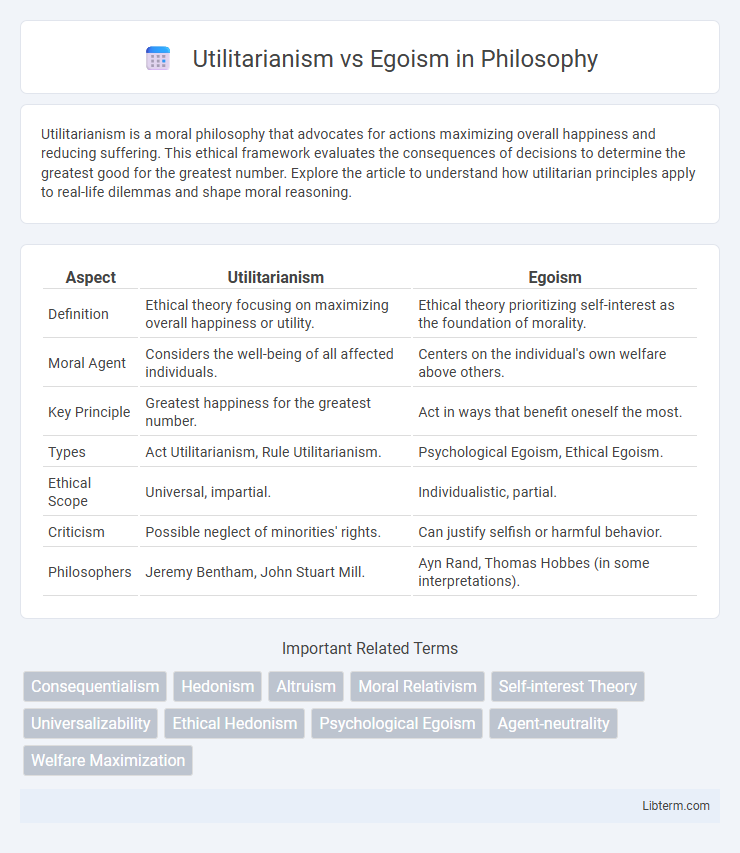Utilitarianism is a moral philosophy that advocates for actions maximizing overall happiness and reducing suffering. This ethical framework evaluates the consequences of decisions to determine the greatest good for the greatest number. Explore the article to understand how utilitarian principles apply to real-life dilemmas and shape moral reasoning.
Table of Comparison
| Aspect | Utilitarianism | Egoism |
|---|---|---|
| Definition | Ethical theory focusing on maximizing overall happiness or utility. | Ethical theory prioritizing self-interest as the foundation of morality. |
| Moral Agent | Considers the well-being of all affected individuals. | Centers on the individual's own welfare above others. |
| Key Principle | Greatest happiness for the greatest number. | Act in ways that benefit oneself the most. |
| Types | Act Utilitarianism, Rule Utilitarianism. | Psychological Egoism, Ethical Egoism. |
| Ethical Scope | Universal, impartial. | Individualistic, partial. |
| Criticism | Possible neglect of minorities' rights. | Can justify selfish or harmful behavior. |
| Philosophers | Jeremy Bentham, John Stuart Mill. | Ayn Rand, Thomas Hobbes (in some interpretations). |
Introduction to Utilitarianism and Egoism
Utilitarianism is an ethical theory that promotes actions maximizing overall happiness or utility for the greatest number of people, rooted in the philosophies of Jeremy Bentham and John Stuart Mill. Egoism, in contrast, emphasizes self-interest as the foundation of morality, where individuals prioritize their own well-being and benefit above others. Both theories address moral decision-making but diverge on whether the focus is collective happiness or individual advantage.
Historical Background of Both Theories
Utilitarianism, developed in the late 18th and early 19th centuries by philosophers Jeremy Bentham and John Stuart Mill, emphasizes maximizing overall happiness and well-being as the foundation of moral decision-making. Egoism, rooted in ancient Greek philosophy with thinkers like Epicurus and later refined by 19th-century scholars such as Max Stirner, centers on actions that serve an individual's own self-interest as the primary ethical consideration. Both theories emerged from distinct historical contexts, with utilitarianism aligning with Enlightenment principles of social reform and egoism reflecting a more individualistic approach to morality.
Core Principles of Utilitarianism
Utilitarianism centers on the core principle of maximizing overall happiness and minimizing suffering for the greatest number of people, emphasizing the collective well-being over individual interests. It evaluates the moral worth of actions based on their consequences, aiming to achieve the highest net utility through impartial consideration. This contrasts with egoism, which prioritizes self-interest and individual benefit as the basis for ethical decision-making.
Core Principles of Egoism
Egoism centers on the principle that individuals should act in ways that maximize their own self-interest and personal well-being, often prioritizing their own goals above others'. It contrasts with utilitarianism, which advocates for actions that produce the greatest good for the greatest number, emphasizing collective benefit rather than individual advantage. The core of egoism lies in ethical egoism, psychological egoism, and rational egoism, all underscoring self-interest as the fundamental driver of human behavior and morality.
Key Philosophers and Their Contributions
John Stuart Mill significantly advanced Utilitarianism by emphasizing the greatest happiness principle, advocating for actions that maximize overall well-being. Jeremy Bentham, often regarded as the founder of Utilitarianism, introduced the concept of quantifying pleasure and pain to guide moral decisions. In contrast, Ayn Rand championed Egoism through Objectivism, asserting that rational self-interest and individual happiness are the highest moral purposes.
Comparison: Moral Decision-Making Approaches
Utilitarianism evaluates moral decisions based on the greatest good for the greatest number, emphasizing collective well-being and consequences. Egoism prioritizes individual self-interest and personal benefit as the basis for ethical choices. The key contrast lies in utilitarianism's focus on maximizing overall happiness, while egoism centers on maximizing individual advantage.
Strengths and Weaknesses of Utilitarianism
Utilitarianism's strength lies in its focus on maximizing overall happiness and promoting collective well-being, making ethical decisions based on the greatest good for the greatest number. Its weakness includes challenges in accurately measuring and comparing individual happiness, and potential neglect of justice and individual rights when minority suffering is justified by majority benefit. Unlike egoism, which prioritizes self-interest, utilitarianism emphasizes impartiality and social welfare but struggles with practical implementation and moral dilemmas involving conflicting interests.
Strengths and Weaknesses of Egoism
Egoism emphasizes individual self-interest as the basis for morality, promoting personal responsibility and clear decision-making, which can lead to increased motivation and self-improvement. However, its weaknesses include potential conflicts with societal well-being, as excessive focus on personal gain may undermine cooperation and ethical obligations to others. This approach often struggles to address collective needs and can justify morally questionable actions if they benefit the individual.
Real-Life Examples and Applications
Utilitarianism guides decision-making in public health policies like vaccination programs, maximizing overall well-being by prioritizing community health benefits. Egoism influences business negotiations where individuals prioritize personal gain, such as entrepreneurs making investment decisions to maximize their own profit. Both ethical frameworks shape behaviors in social and professional contexts, reflecting the balance between collective welfare and individual self-interest.
Conclusion: Which Ethical Theory Prevails?
Utilitarianism prevails as the dominant ethical theory due to its emphasis on maximizing overall happiness and promoting the greatest good for the greatest number. Egoism, by prioritizing self-interest, often neglects the welfare of others and can lead to conflicts and social disharmony. The inclusive and collective approach of utilitarianism aligns better with ethical decision-making in diverse and interconnected societies.
Utilitarianism Infographic

 libterm.com
libterm.com